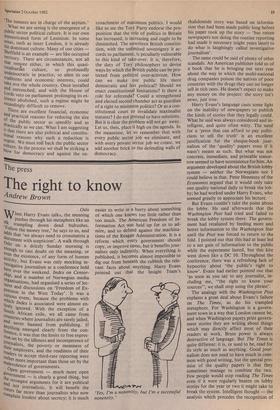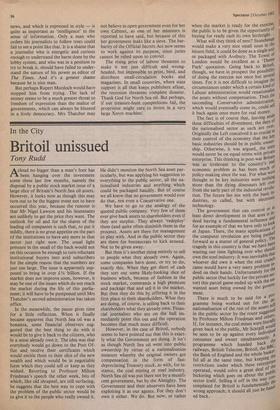The press
The right to know
Andrew Brown Oslo When Harry Evans talks, the meaning elk Pushes through his metaphors like an ,dtrampling down dead bulrushes. Follow the money tree,' he says to us, and adds that 'we always need to crossmatrix a document with scepticism'. A walk through Oslo on a drizzly Sunday morning is enough to cast doubt on the meaning, or even the existence, of any form of human 44'14, but Evans was only mocking in- vestigative journalism at a conference held here over the weekend. Index on Censor- Ship, and a number of Norwegian media °rganisations, had organised a series of lec- tures and discussions on 'Freedom of Ex- Pression in the West Today'. It was a curious event, because the problems with which Index is associated were almost en- tirely ignored. With the exception of a South African exile, we all came from countries where journalists are rarely jailed, and never banned from publishing. If anything emerged clearly from the con- f'rence, it was that the limits to free expres-
on set by the idleness and incompetence of
Journalists, the poverty or meanness of then- e, the of their readers m toployers acceptand third-rate rreadinesseporting were rather more important than those set by the malevolence of governments. °Pen government — much more open hvernment — is clearly a good thing, but the strongest arguments for it are political and not journalistic. It will benefit the voters far more than journalists who now e°141ain loudest about secrecy; it is much
easier to write in a hurry about something of which one knows too little rather than too much. The American Freedom of In- formation Act was held up for us to ad- mire, and to defend against the machina- tions of the Reagan Administration. It is a reform which every government should copy, or improve upon, but it benefits jour- nalists only indirectly. When everything is published, it becomes almost impossible to dig out from beneath the rubbish the rele- vant facts about anything. Harr.y Evans pointed out that the Insight Team's 'Yes, I'm a nonentity, but I'm a successful nonentity.' thalidomide story was based on informa- tion that had been made public long before his paper took up the story — 'but rotten newspapers not doing the routine reporting had made it necessary (eight years later) to do what is laughingly called investigative journalism'.
The same could be said of plenty of other scandals. An American publisher told us of a book that he is bringing out next year about the way in which the multi-national drug companies poison the natives of poor countries with the drugs they can no longer sell in rich ones. He doesn't expect to make any money on the project: the story isn't news, just true.
Harry Evans's language casts some light on the inability of newspapers to publish the kinds of stories that they legally could. What he said was always considered and in- telligent, and quite often witty. The need for a 'press that can afford to pay politi- cians to tell the truth' is an excellent justification for the cheque-book jour- nalism of the 'quality' papers even if it wasn't meant as such. But what was not concrete, immediate, and printable tomor- row seemed to have no;existenceforIhim.An argument developed about the British lobby system — neither the Norwegians nor I could believe in that. Peter Hennessy of the Economist argued that it would only take one quality national daily to break the lob- by; he had worked under Harry Evans, who seemed greatly to appreciate his lecture.
But Evans couldn't take the point about the lobby. He said afterwards that the Washington Post had tried and failed to break the lobby system there. The govern- ment had retaliated by feeding more and better information to the Washington Star until the Post was forced to return to the fold. I pointed out that this had at least led to a net gain of information to the public while the experiment lasted, but this kite went down like a DC 10. Throughout the conference, there was a refreshing lack of hypocrisy about 'the public's right to know'. Evans had earlier pointed out that 'as soon as you say to any journalist, in- cluding me, "the right to know your sources", we shall stop using the phrase'.
The analogy with the Washington Post explains a great deal about Evans's failure on The Times, as do his trampled metaphors. For Washington is a govern- ment town in a way that London cannot be, and when Washington papers print govern- ment stories they are writing about things which may directly affect most of their readers at work. Brute power is always destructive of language. But The Times is quite different: it is, or used to be, read for its style as much as anything. Good jour- nalism does not need to have much in com- mon with good writing, but the special pro- mise of the quality papers is that they sometimes manage to combine the two. Few people would stop reading The Times even if it were regularly beaten on lobby stories for the year or two it might take to break the system. Intelligent thought — the analysis which precedes the recognition of news, and which is expressed in style — is quite as important as 'intelligence' in the sense of information. Only a man who orders his journalists to follow trees could fail to see a point like that. It is a shame that a journalist who is energetic and curious enough to understand the harm done by the lobby system, and who was in a position to try to break it, should have failed to under- stand the nature of his power as editor of The Times. And it's a greater shame because he is nice man.
But perhaps Rupert Murdoch would have stopped him from trying. The lack of money seems to be a much greater threat to freedom of expression than the malice of governments, which can always be blunted in a lively democracy. Mrs Thatcher may not believe in open government even for her own Cabinet, as one of her ministers is reported to have said, but because of this her government leaks like a sieve. The bar- barity of the Official Secrets Act now seems to work against its purpose, since juries cannot be relied upon to convict.
The rising price of labour threatens to make it not just difficult and wrong- headed, but impossible to print, bind, and distribute small-circulation books and magazines. In small countries, where state support is all that keeps publishers afloat, the recession threatens complete disaster. Thank God for North Sea oil. But perhaps, if our treasure-hunt competitions fail, the proprietor might care to invest in a very large Xerox machine.







































 Previous page
Previous page